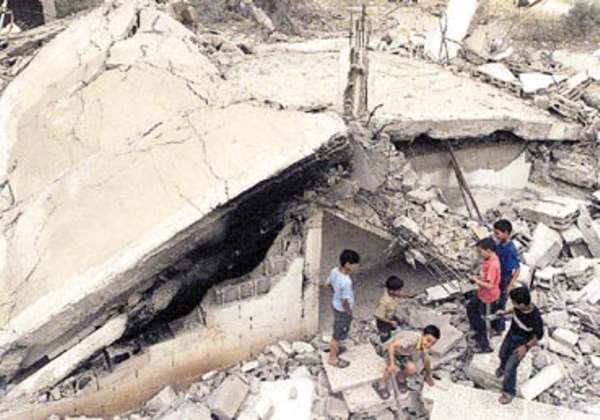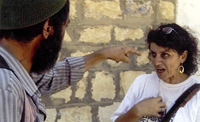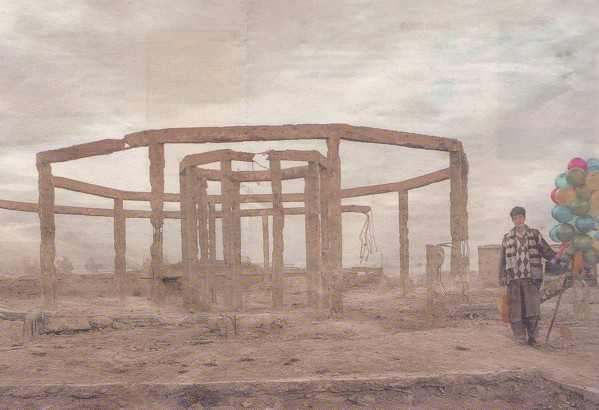
september 2004


GEORGE W.
BUSH: THE DUKE
OF PLAZA-TORO
Raymond Deane
If George W. Bush wins the November presidential election in the teeth of the literary onslaught to which he has lately been subjected, it will be proof positive that books have lost all impact. The latest salvo in this campaign comes from Liverpudlian turned New Yorker Ian Williams who, although the author of such books as The UN for Beginners and The Alms Trade, is better-known as a journalist for The Nation and the London-based Middle East International.
Bush - known in his infancy as Googen, a nugget that will be new to most of us - is exposed as a brawling drunken layabout whose family influence got him into the Texas Air National Guard despite his dire pilot aptitude test scores, a sure guarantee that he would escape military action in Vietnam. "As President George W. Bush and his party decry the inequity of affirmative action for minorities," comments Williams, "we should pause and reflect on how many bonus points his bluish blood added to his grades to get him through." During his National Guard days there is a lengthy period during which he appears to have quite simply gone AWOL. Williams posits an arrest for heroin possession in Houston in 1972, when Bush "had the record expunged by a judge who was 'a fellow Republican and elected official' who helped Bush get off 'with a little community service... instead of having to pick cotton on a Texas prison farm.'" The quote within a quote here is from Fortunate Son by James H. Hatfield, a book that was pulled from the shelves shortly after publication in 1999 when the Republicans unearthed the fact that its author had had a murder conviction years before. (The book was subsequently reissued, but Hatfield, a depressive, committed suicide in 2001. Disappointingly, there is apparently no implication of foul play.)
On May Day 2003 the delinquent chicken-hawk, now 43d president of the US, alighted from a fighter plane on the deck of the USS Abraham Lincoln to declare victory in the illegal war upon Iraq, against the backdrop of a banner declaring "mission accomplished." Over the ensuing 12 months this stage-managed spectacle (the Abraham Lincoln was anchored within sight of the San Diego coast) has come to seem increasingly hollow in view of the deepening chaos and mounting death-toll in Iraq. Meanwhile, troops are suffering serious shortages of equipment, often spending their own money to buy belts, underwear, socks and gloves, to say nothing of efficient body-armour. The desert sands wreak havoc on high-maintenance firearms, so for want of an efficient lubricant soldiers use condoms to keep their guns clean, which, comments Williams, "would give the moral majority supporters of the war something to chew on." Pay and morale of military personnel are equally low, so that "experienced military types... are dropping out of the military to earn double or quadruple pay" as mercenaries in private security firms.
Deserter begins with a "timeline" of Bush's non-existent military career, juxtaposed with John Kerry's contrasting achievements in this domain. Reading it, I found it difficult not to recall those exchanges between Kerry and Wesley Clarke during the Democratic selection campaign in which the candidates effectively vied with one another as to which of them had killed the most "gooks". Williams knows that he runs the risk of seeming to endorse militarism as a criterion for presidential eligibility, however often he nuances his stance, and that an apparent call for increased military spending sits uneasily with his leftist credentials. He stresses that "If there is one thing worse than having a military career and flaunting it - it is pretending to have one and flaunting it while sending other people to die." The difference may come to seem marginal if and when Kerry reaches the White House. As far as Israel's US-backed war against the Palestinian people is concerned, his pronouncements suggest that he is as much in the pocket of AIPAC (the America Israel Public Affairs Committee) as any of his predecessors. His running-mate John Edwards even refers to Israel as the "underdog"... If Deserter contributes towards Bush's defeat, then it will have helped to replace a corrupt, revolutionary and rotten regime with one that is merely rotten. Such is the range of choice thrown up by liberal democracy, that crowning achievement of Western political culture.
This book has the look of a rushed job, a fact confirmed by the author in his dedication (partly to those "who helped turn it around so quickly") and evident in the absence of an index and the proliferation of misprints. However, fans of Ian Williams's puckish style - and I have been one for over a decade - may be reassured that Deserter is a compendium of felicitous metaphors and allusions. Bush's flying visit to Iraq for Thanksgiving 2003 (when "he strutt[ed] with a turkey instead of like one") and the May Day landing on the Abraham Lincoln are described as "an elaborate illusion... conjured up to persuade the peasantry, the voters, that their leader has martial virtues" and described as a reversal of the process devised by Count Potemkin to deceive the Czarina Catherine. Bush's press office "reincarnates these creative combinations of Baron von Munchhausen and Walter Mitty..." An entire aria from Gilbert and Sullivan's Gondoliers is quoted to push home a comparison between Bush and "That unaffected,/ Undetected,/ Well-connected/ Warrior,/ The Duke of Plaza-Toro!" The Good Soldier Schweik, Samuel Johnston, Thomas à Beckett, Romain Rolland, Sergeant Bilko, Lewis Carroll, John Webster and Rudyard Kipling are hurled pell-mell into the argument. Whether or not Deserter helps get rid of George W. Bush, its receptive readers will have been shown a good time.
Ian Williams: DESERTER - Bush's War on Military Families, Veterans, and His Past. Nation Books, 2004
*****************************
Racist Tracts: Anti-Islamic Book Fuels Racism in Italy, Manchurian Candidates Does the Same in America
By Sam Hamod
Al-Jazeerah, August 9, 2004
Commentary on EURABIA by Orianna Fallaci and new unoriginal copy of The Manchurian Candidate
Eurabia, by Orianna Fallaci, the newest Islamaphobia and Arabophobia tract from Europe is now joined by the anti-Arab, anti-Muslim twisted version of the fine classic, The Manchurian Candidate, in America.
This tract, I prefer not to call it a book because of how poorly it's written and thought out, is filled with stereotypes and allegations that are preposterous, Orianna Fallaci made a fool of herself in this anti-Islamic tract. In this, she warns about "an Arab invasion of Europe" that is replete with racist comments, unfounded fears and pure nonsense. As one critic, Alberto Calabrese, pointed out, "Whatever credibility Ms. Fallaci had is now gone--totally gone. This is a shameful day for Italy."
Yet, because it is being pushed by her media outlet friends,especially the media mogul of Italy, PM Berlusconi, who is pro-Israel and anti-Arab, the book is finding a lot of buyers. This is the purest form of ignorant racism. As one veteran Italian journalist who was a long time friend of hers and wishes to be un-named, put it to me in an interview yesterday, "Orianna has lost her mind, either that or someone has given her a big fat wallet full of money to write this garbage."
Her book has been likened to the fear that John Ashcroft has perpetrated in America against Muslims and Arabs. It seems this phobia and this type of racism is allowed in the West; this is a new chapter in the "new crusade" that GW Bush spoke about when he made a Freudian slip early in his attacks on Afghanistan. This crusade mentality of his was evidenced even further when he went into Iraq under what he knew were false allegations of WMD's.
We should also point out that there have been rumors for years of a relationship between Fallaci and the anti-Muslim PM of Italy, Berlusconi. There is no doubt that Berlusconi's media empire helped to get this book published and his media outlets have been touting it--so it has become "successful." Unfortunately, this type of rampant racism will ultimately feed more racism and reaction in the Muslim world--which will not benefit anyone.
In their own way, these types of books and the media's anti-Islamic tendencies may even start a kind of covert WWIII--between some Westerners and Islam, as is happening in the US with such false "scholars" as Daniel Pipes and Bernard Lewis who feed this same ignorant stereotyping, that is now also being fed by the recently released copy of the classic movie, The Manchurian Candidate. One wonders how much they had to bribe Denzel Washington with to put himself into such a racist movie; a racism against Islam and a Muslim scientist that is outrageous on its face and in its motive.
The original movie had the communist take-over of America as its basis, with brainwashing techniques that came out of the Korean War. This technique is brilliantly explained in a fine book, Battle For the Mind. But now, with the zionist influence in Hollywood--guess what-- the madmen are Muslims. Another cheap shot. Thus, I recommend that all who are sensible, all who are sick of the anti-Arabism in the U.S. and all who are sick of the anti-Muslim sentiment, that you not go see this movie because you are putting money into the pockets of the enemy of democracy, the enemy of decency and the enemies of peace, Islam and the Arabs.
Sam Hamod is an expert on the Middle East and Islam; a former advisor to the State Department; professor; editor; retired director of The Islamic Center in Wash, DC; he may be reached at shamod@cox.net
*******************************
ww.arabfilm.com
| In The Spotlight | |
|
Zuhaira Sabbagh, a young
Arab woman with an Israeli passport, leads a
youth group in Nazareth during her free time.
“Armed” with nothing more than cameras,
the group searches for ruins of Arab villages
that were destroyed by the Israeli army in 1948. These investigations provide a way for the youth group to peacefully resist Israeli attempts to erase all traces of a time when the land was home to Palestinians. The group’s efforts are met with strong opposition from the Israeli inhabitants. During her investigations, Zuhaira Sabbagh meets Swiss doctor Hans Bernath and his wife who, as delegates of the Red Cross, have witnessed the most important phases of this Middle East conflict. |
| Feature Film: | |
| • Canticle of the Stones | Michel Khleifi, 1990, 110 minutes, |
| • Chronicle of a Disappearance | Elia Suleiman, 1996, 88 minutes, |
| • Fertile Memory | Michel Khleifi, 1980, , |
| • Milky Way, The | Ali Nassar, 1997, 104 minutes, |
| • Rana's Wedding | Hany Abu-Assad, 2002, 90 min, |
| • Tale of the Three Jewels | Michel Khleifi, 1995, 107 minutes, |
| • Wedding In Galilee | Michel Khleifi, 1987, 113 minutes, |
| Documentary: | |
| • 500 Dunam on the Moon | Rachel Leah Jones, 2002, 48 minutes, |
| • Al Nakba: The Palestinian Catastrophe 1948 | Benny Brunner and Alexandra Jansse, 1998, 56 minutes, |
| • Al-Sabbar (Cactus) | Patrick Bürge, 2000, 97 minutes, |
| • Checkpoint | Tom Wright and Therese Saliba, 1997, 58 minutes, |
| • Children of Fire | Mai Masri, 1990, 50 minutes, |
| • Children of Ibdaa, The | S. Smith Patrick, 2002, 29 minutes, |
| • Collecting Stories From Exile: Chicago Palestinians Remember 1948 | Jennifer Bing-Canar, 1999, 28 minutes, |
| • Dreams and Silence | Omar Al-Qattan, 1991, 52 minutes, |
| • Dreams of Justice and Freedom with Hanan Ashrawi | Christopher Swann, 1995, 52 minutes, |
| • Forbidden Marriages in the Holy Land | Michel Khleifi, 1995, 66 minutes, |
| • Frontiers of Dreams and Fears | Mai Masri, 2001, 56 minutes, |
| • Gaza Ghetto: Portrait of a Palestinian Family | PeA Holmquist, Joan Mandell, Pierre Bjorklund, 1984, 82 minutes, |
| • Gaza Strip | James Longley, 2002, 74 minutes, |
| • Going Home | Omar Al-Qattan, 1995, 48 minutes, |
| • Grapes and Figs Are In Season: A Palestinian Woman's Story | Emily Mansur Shihadeh and Victoria Rue, 1999, 67 minutes, |
| • Hanan Ashrawi: A Woman of Her Time | Mai Masri, 1995, 50 minutes, |
| • If You Make it Possible | Lynn Feinerman, 1996, 75 minutes, |
| • Introduction to the End of an Argument | Jayce Salloum and Elia Suleiman, 1990, 45 minutes, |
| • Jenin Jenin | Mohamed Bakri, 2002, 54 minutes, |
| • Jerusalem 1948: Yoom Ilak, Yoom Aleik | Leon Willems and Tinus Kramer, 1998, 45 minutes, |
| • Jerusalem: An Occupation Set in Stone? | Marty Rosenbluth, 1995, 55 minutes, |
| • Mahmoud Darwich: As the Land Is the Language | Simone Bitton, 1997, 60 minutes, |
| • Nightfall | Mohamed Soueid, 2000, 70 minutes, |
| • Paul the Carpenter | Ibrahim Khill, 2000, 52 minutes, |
| • Peace, Propaganda & The Promised Land | Bathsheba Ratzkoff & Sut Jhally, 2004, 80, |
| • People and the Land | Tom Hayes, 1997, 57 minutes, |
| • Selves and Others: A Portrait of Edward Said | Emmanuel Hamon, 2003, 54 minutes, |
| • Tragedy in the Holy Land: The Second Uprising | Denis Mueler, 2002, 71 minutes, |
| • Voices in Exile: Immigrants and the First Amendment | Joan Mandell & Laura Hayes, 1989, 30 minutes, |
| • Water Wars: Struggle in the Holy Land | Iain Taylor, 1997, 26 minutes, |
| • We are God's Soldiers | Hanna Musleh, 1993, 52 minutes, |
| Books: | |
| • Searching Jenin | , 2003, 288 pages, |
| • Arab Cinema: History and Cultural Identity | , 1998, 255 pages, |

